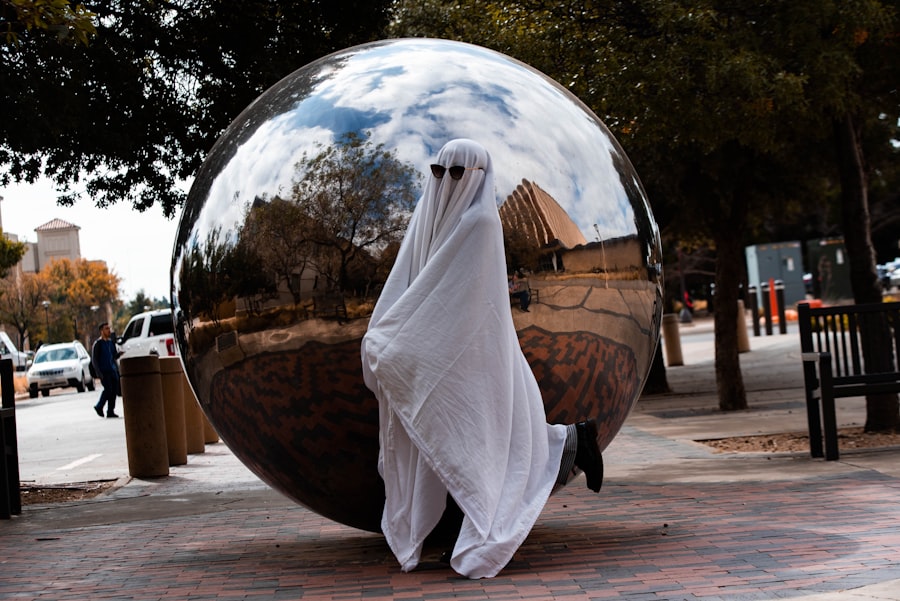The Global Consciousness Project (GCP) represents a fascinating intersection of science, technology, and the exploration of human consciousness. Launched in 1998, this ambitious initiative seeks to investigate the potential connections between collective human consciousness and random events occurring around the world. The project posits that significant global events may influence the behavior of random number generators (RNGs), suggesting a form of interconnectedness among individuals that transcends geographical and cultural boundaries.
By examining these correlations, the GCP aims to shed light on the nature of consciousness itself and its possible implications for humanity. The GCP has garnered attention not only for its innovative approach but also for the profound questions it raises about the nature of reality and human experience. As the world becomes increasingly interconnected through technology and communication, understanding the dynamics of collective consciousness may hold the key to addressing some of society’s most pressing challenges.
The project invites individuals from all walks of life to ponder their role in this shared consciousness and consider how their thoughts and feelings might resonate with others on a global scale.
Key Takeaways
- The Global Consciousness Project aims to study the potential interconnectedness of human consciousness through a network of random number generators.
- The project is based on the hypothesis that global events can influence the behavior of these random number generators, indicating a potential global consciousness effect.
- Roger Nelson, a former research coordinator at Princeton University, is the founder of the Global Consciousness Project and has been leading the research efforts since its inception.
- The project works by continuously collecting data from random number generators located around the world and analyzing the results to look for correlations with major global events.
- Random number generators are used as a tool to measure potential deviations from randomness, which could indicate a global consciousness effect during significant events such as natural disasters or mass gatherings.
The Science Behind the Project
At its core, the Global Consciousness Project is grounded in scientific inquiry, employing rigorous methodologies to explore the relationship between human consciousness and RNGs. The project utilizes a network of RNGs distributed across various locations worldwide, which continuously generate random numbers. The underlying hypothesis is that during moments of heightened emotional intensity—such as natural disasters, political upheavals, or significant cultural events—these RNGs may exhibit deviations from randomness, indicating a potential influence of collective human consciousness.
The scientific framework of the GCP draws upon principles from fields such as psychology, physics, and statistics. Researchers analyze data collected from RNGs during specific global events, looking for patterns that suggest correlations between collective emotional states and RNG output. By employing statistical techniques to assess these patterns, the GCP aims to provide empirical evidence for its hypotheses while also contributing to broader discussions about consciousness and its implications for human behavior.
Roger Nelson: The Man Behind the Project

Roger Nelson, a psychologist and researcher at Princeton University, is the visionary behind the Global Consciousness Project. With a background in experimental psychology and a keen interest in parapsychology, Nelson has dedicated much of his career to exploring the boundaries of human consciousness. His work on the GCP reflects his belief in the interconnectedness of all people and the potential for collective consciousness to influence reality.
Nelson’s journey into this realm began with his fascination for understanding how individual thoughts and emotions might resonate on a larger scale. He recognized that significant global events often evoke strong emotional responses from people around the world, leading him to hypothesize that these shared experiences could impact RNG outputs. Through his leadership, Nelson has fostered a collaborative environment that encourages researchers from diverse disciplines to contribute to the project, enriching its findings and expanding its reach.
How the Project Works
| Step | Description |
|---|---|
| 1 | Gather project requirements |
| 2 | Design project plan |
| 3 | Allocate resources |
| 4 | Implement project plan |
| 5 | Test project deliverables |
| 6 | Review and make adjustments |
The Global Consciousness Project operates through a network of RNGs strategically placed in various locations around the globe. These devices continuously generate random numbers, which are then transmitted to a central database for analysis. The project relies on a combination of real-time data collection and retrospective analysis to identify correlations between RNG outputs and significant global events.
To determine whether collective consciousness has an impact on RNG behavior, researchers analyze data from these devices during specific timeframes associated with major events. By comparing the RNG outputs during these periods with baseline data collected during neutral times, they can assess whether there are statistically significant deviations from randomness. This process involves sophisticated statistical techniques designed to account for potential confounding variables, ensuring that any observed effects can be attributed to collective emotional states rather than random chance.
The Role of Random Number Generators
Random number generators play a pivotal role in the Global Consciousness Project, serving as the primary tools for measuring potential influences of collective consciousness. These devices are designed to produce numbers that are statistically random, meaning that each number generated should be independent of previous numbers. However, the GCP posits that during moments of heightened emotional intensity, this randomness may be disrupted.
The RNGs used in the project are not merely electronic devices; they are carefully calibrated instruments that adhere to strict scientific standards. By generating vast amounts of data over time, these RNGs provide a rich source of information for researchers seeking to understand the nuances of human consciousness. The project’s reliance on RNGs underscores its commitment to empirical research while also inviting philosophical inquiries into the nature of randomness and order in the universe.
The Global Events That Have Been Studied

The Global Consciousness Project has examined a wide array of global events that evoke strong emotional responses from people around the world. These events range from natural disasters, such as earthquakes and tsunamis, to significant political occurrences like elections or terrorist attacks. Each event serves as a focal point for researchers to analyze whether collective emotional states can influence RNG outputs.
One notable example is the study conducted during the September 11 attacks in 2001. Researchers observed significant deviations in RNG outputs during this tragic event, suggesting that the collective grief and shock experienced by millions may have had an impact on randomness. Similarly, other events such as major sporting competitions or global celebrations have also been analyzed, providing a diverse dataset for understanding how collective emotions manifest in measurable ways.
The Results and Findings of the Project
The findings of the Global Consciousness Project have sparked both intrigue and debate within scientific communities and beyond. Over the years, researchers have reported statistically significant deviations in RNG outputs during various global events, supporting the hypothesis that collective consciousness can influence randomness. These results have led to discussions about the implications for understanding human interconnectedness and the nature of reality itself.
While some studies have shown compelling evidence for correlations between collective emotional states and RNG behavior, it is essential to approach these findings with caution. The GCP emphasizes transparency in its research methods and encourages replication studies to validate its results. As such, while there is growing interest in the implications of these findings, ongoing research is necessary to deepen understanding and address potential criticisms.
Criticisms and Controversies Surrounding the Project
Despite its innovative approach, the Global Consciousness Project has faced criticism from skeptics who question its scientific rigor and methodology. Some critics argue that deviations in RNG outputs could be attributed to chance rather than collective consciousness, suggesting that observed patterns may not be statistically significant upon closer examination. Others contend that the project lacks a clear theoretical framework to explain how collective emotions could influence randomness.
In response to these criticisms, proponents of the GCP emphasize the importance of open dialogue within scientific inquiry. They argue that exploring unconventional ideas about consciousness can lead to new insights and foster interdisciplinary collaboration. By inviting scrutiny and encouraging replication studies, the GCP aims to strengthen its findings while contributing to broader discussions about consciousness and its implications for humanity.
The Implications for Human Consciousness
The implications of the Global Consciousness Project extend far beyond academic inquiry; they touch upon fundamental questions about human existence and interconnectedness. If collective consciousness can indeed influence reality, it raises profound questions about individual agency and responsibility.
Moreover, exploring these connections could have practical applications in fields such as psychology, sociology, and even conflict resolution. By recognizing that shared emotional experiences can shape societal dynamics, individuals may be inspired to foster empathy and compassion in their interactions with others. The GCP invites people to consider their role within this larger tapestry of consciousness and encourages them to engage with their thoughts and feelings in ways that promote positive change.
Future Directions for the Global Consciousness Project
As the Global Consciousness Project continues to evolve, its future directions hold promise for further exploration into the nature of consciousness and its implications for humanity. Researchers are actively seeking new methodologies and technologies to enhance data collection and analysis, allowing for more nuanced investigations into collective emotional states. Additionally, expanding collaborations with scientists from diverse fields may yield fresh perspectives on understanding consciousness.
The GCP also aims to engage with broader audiences through educational initiatives and outreach programs. By fostering public interest in consciousness studies, the project hopes to inspire individuals to reflect on their own experiences and consider how they contribute to collective emotional landscapes. As technology advances and our understanding of consciousness deepens, the GCP stands poised to play a pivotal role in shaping future discussions about what it means to be human.
How You Can Get Involved
Individuals interested in exploring the themes presented by the Global Consciousness Project have several avenues for involvement. One way is through participation in online forums or discussions where researchers share insights and findings related to consciousness studies. Engaging with these communities can provide valuable opportunities for learning and collaboration.
Additionally, individuals can contribute by participating in experiments or surveys designed to gather data on collective emotional experiences during significant global events. By sharing their thoughts and feelings during these moments, participants can help researchers better understand how individual experiences contribute to collective consciousness. Ultimately, involvement in the GCP offers a unique opportunity for individuals to connect with others while exploring profound questions about human existence and interconnectedness.
The Global Consciousness Project, spearheaded by Roger Nelson, explores the intriguing hypothesis that human consciousness can influence random number generators, suggesting a collective interconnectedness of minds. A related article that delves into similar themes of consciousness and its potential global impact can be found on X File Findings. This article provides further insights into the mysterious ways in which human thought might interact with the physical world, echoing the core ideas of Nelson’s project. For more information, you can read the article by visiting X File Findings.
😲 WATCH THIS! The Secret Data That Proves Our Reality Is A Shared Illusion
FAQs
What is the Global Consciousness Project?
The Global Consciousness Project (GCP) is a research project that aims to investigate the possibility of interconnected consciousness among humans through the use of random number generators placed in various locations around the world.
Who is Roger Nelson?
Roger Nelson is a researcher and former professor of psychology at Princeton University. He is the founder of the Global Consciousness Project and has been involved in parapsychology and consciousness research for many years.
How does the Global Consciousness Project work?
The GCP uses a network of random number generators (RNGs) placed in different locations around the world to collect data. The RNGs produce a sequence of random numbers, and the project looks for deviations from randomness that may be correlated with global events or periods of focused attention.
What is the purpose of the Global Consciousness Project?
The main purpose of the GCP is to explore the possibility of a global consciousness or interconnectedness among humans. The project aims to investigate whether human consciousness can have an influence on the behavior of random number generators, and if so, what implications this may have for our understanding of consciousness and interconnectedness.
What are some of the findings of the Global Consciousness Project?
The GCP has reported statistically significant deviations from randomness in the data collected during major global events such as natural disasters, terrorist attacks, and large-scale celebrations. These findings suggest a potential correlation between global events and the behavior of the random number generators, which may indicate a form of interconnected consciousness.
